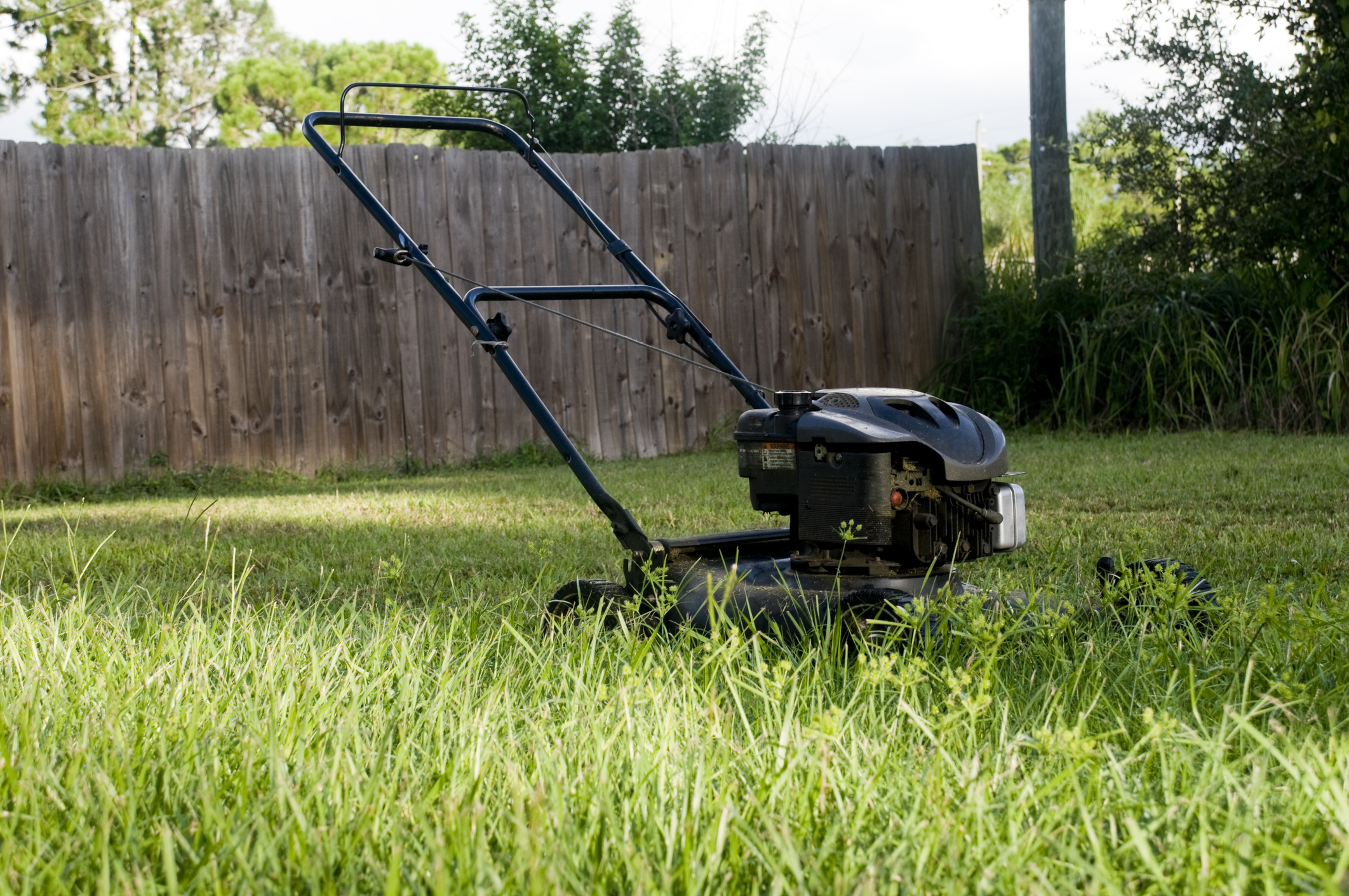
Storing a lawn mower isn't difficult. Yet, the way we store them does make a difference to how long a mower lasts and how well it performs. The best lawn mower storage ideas will protect your machine from damage and ensure its longevity, whether it's a push, gas, electric or ride-on model.
Shoving a lawn mower in a shed might be the easiest solution, but if it's covered in grass, or the shed is cold and damp, you could be inviting trouble. "Proper lawn mower storage helps prevent rusting, corrosion, and deterioration of parts due to exposure to moisture, sunlight, and debris," says Brad Ducat, Mowing expert and Sales Manager, Bradley Mowers. "This can significantly extend the lifespan of the mower."
To better utilize your outdoor storage ideas, a few minor tweaks to the way you store your mower could reap large rewards in the long term, allowing you to cut your grass and maintain your lawn with ease. Here's how you can do just that.
5 Lawn Mower Storage Ideas
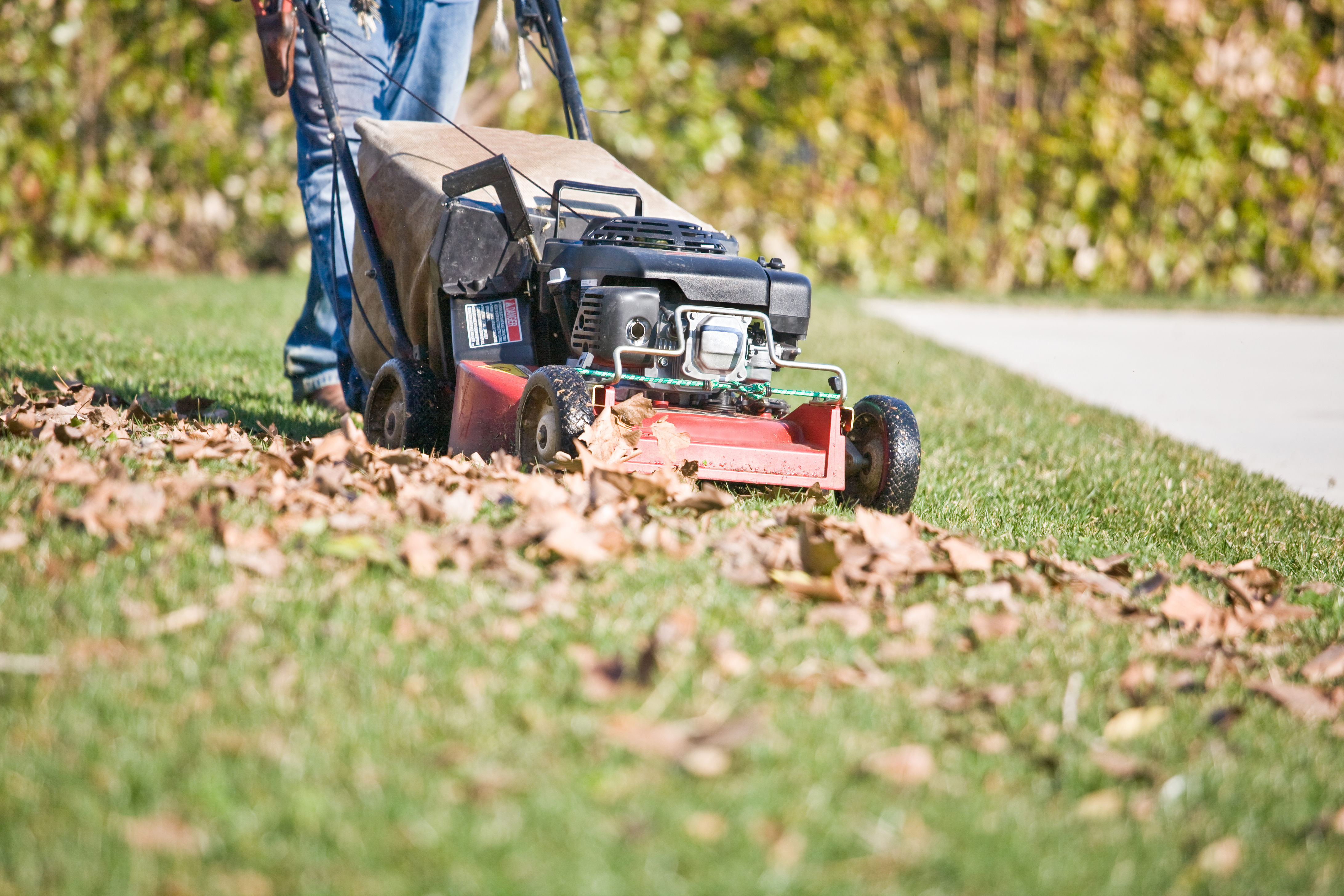
Storing your gardening tools in the right place, especially your lawn mower is essential for the best performance from your tools — and the experts agree.
Brad Ducat, mowing expert and Sales Manager, Bradley Mowers says: "Storing the mower correctly helps maintain its performance over time. This includes keeping the engine, blades, and other components in good condition so that the mower operates effectively when it's next used."
Here's how you can store your lawn mower — according to experts.
1. Clear a space in the garden shed
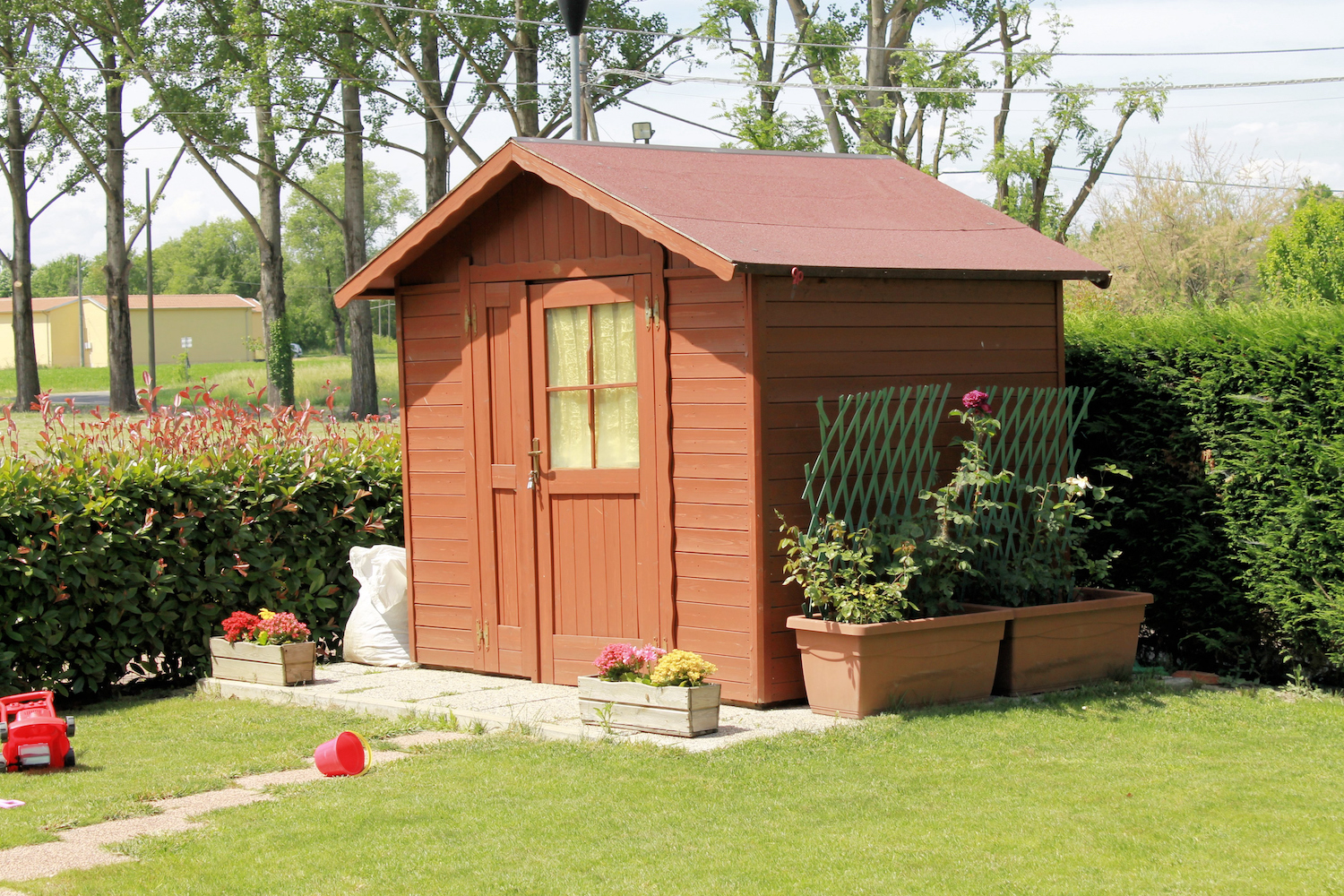
The garden shed is a popular place to store you backyard essentials, along with many other things you probably should not keep in a shed. Which is why you should try and create a dedicated space for your lawn mower. The conditions also need to be right. Sheds can be damp places, which could negatively affect a lawn mower, as moisture will corrode metal over time. So it's important that your shed is watertight.
"A dry shed with easy ground level access or a good ramp is ideal to store your lawn mower," says Pittsburgh-based, Quinten O'Dea, co-founder, Q&A Landscaping. "A shed with excess moisture can lead towards condensation in the fuel and quicker rusting of key components. Electric lawn mowers are even more sensitive to moisture and should be kept in dry areas. Electric lawn mowers are also susceptible to cold temperatures hindering battery performance."
"If you're going to store your lawn mower in a shed, ensure the shed is well-ventilated to prevent dampness, which can cause rust and other damage," says Tony O'Neill, gardener and founder, Simplify Gardening.
Tony continues: "Store the mower on a flat, stable surface to prevent tipping and damage. And make sure there is easy access to the mower without having to move other items around. Before storing, clean off any grass clippings and debris to prevent mold and corrosion. And if storing a gas mower for an extended period, drain the fuel to prevent it from going stale and clogging the carburetor."
"Consider using a mower cover or storing the mower in an enclosed area within the shed to protect it from dust and moisture," adds Brad Ducat, Bradley Mowers. "For mowers with batteries (usually on electric models), disconnect the battery and store it separately if the shed is not temperature-controlled. Finally, ensure the shed is secure with a lock to prevent theft or un-authorized use of the mower."
2. Choose a corner of the garage
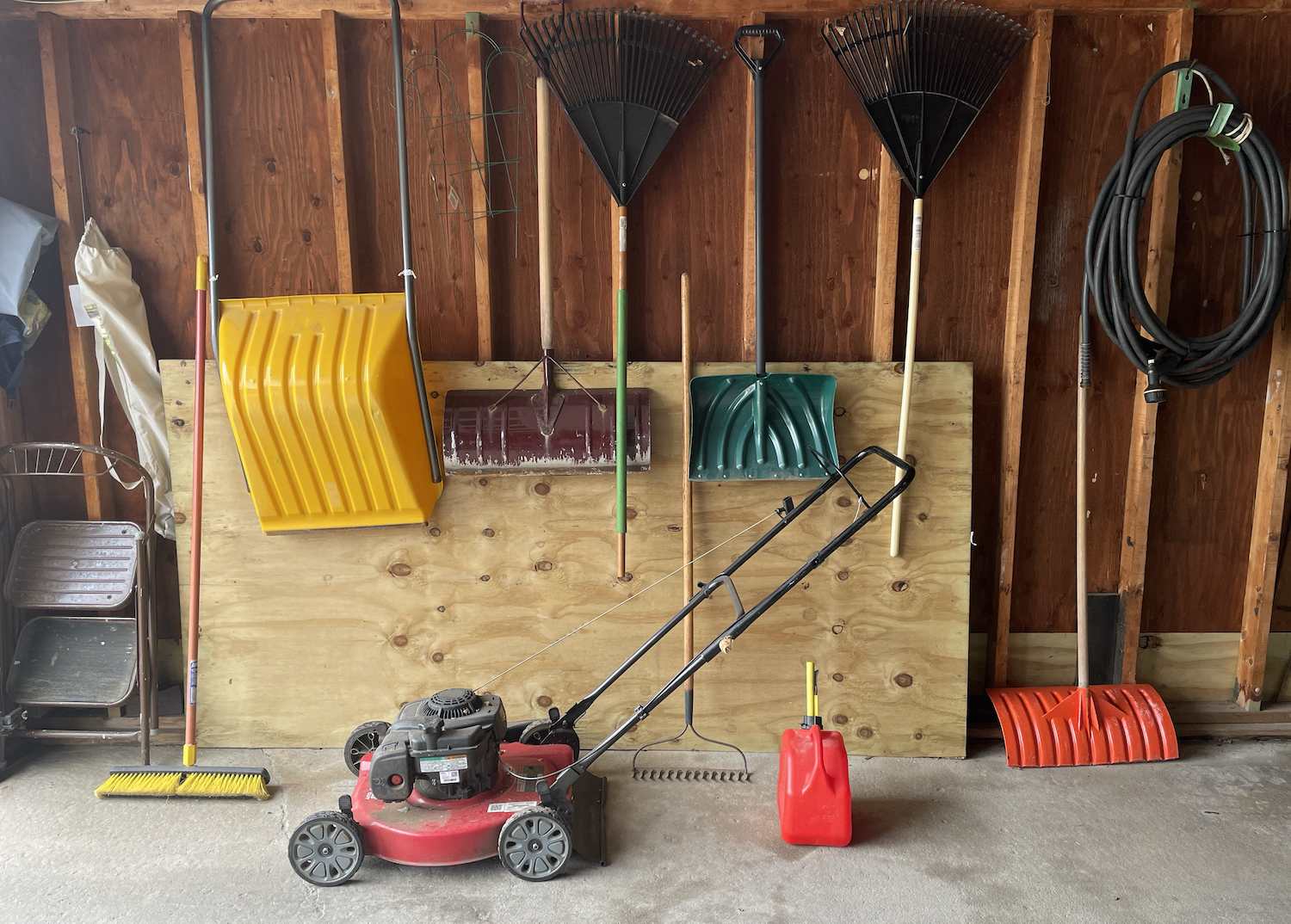
Storing your lawn mower in the garage is another popular choice — which can often make your garage organization ideas a little more complicated. I mean, let's face it, it can get messy if you don't create the necessary space for your garden goods. However, the main advantage of a garage is that it tends to be both dry and secure. Obviously, you'll need to ensure there's enough space to access your lawn mower when any vehicles are parked in the garage.
"Garages typically provide better protection against the elements compared to outdoor sheds,' says Brad Ducat. "This includes protection from rain, snow, UV rays, and extreme temperatures, which can all contribute to rust and deterioration. Garages are often more secure than sheds, they usually have more space and are easier to organize, allowing for better placement of the mower without obstructing pathways or moving other items.
He continues: "If you have a workbench in your garage, utilize the space underneath for storing the mower. Make sure there is enough clearance and accessibility for maintenance and retrieval. Alternatively, use vertical storage racks designed specifically for lawn mowers. These racks securely hold the mower upright, minimizing the footprint while keeping it easily accessible. Be cautious when storing flammable materials (like gasoline) in the garage. Store them properly and away from heat sources or potential ignition points."
"Like sheds, garages should be well-ventilated to prevent dampness and fuel fumes from accumulating, so open doors and windows regularly,' says Tony O'Neill. For safety reasons, ensure the mower is stored in a way that it doesn’t obstruct walkways or pose a tripping hazard."
Quinten O'Dea tells us, it is safe to store gas and electric mowers of different sizes in the garage, but "they will bring some of the mess from the decomposing grass with them, so do put some extra effort into cleaning them off periodically."
3. Install a dedicated mower shed, caddy or cabinet
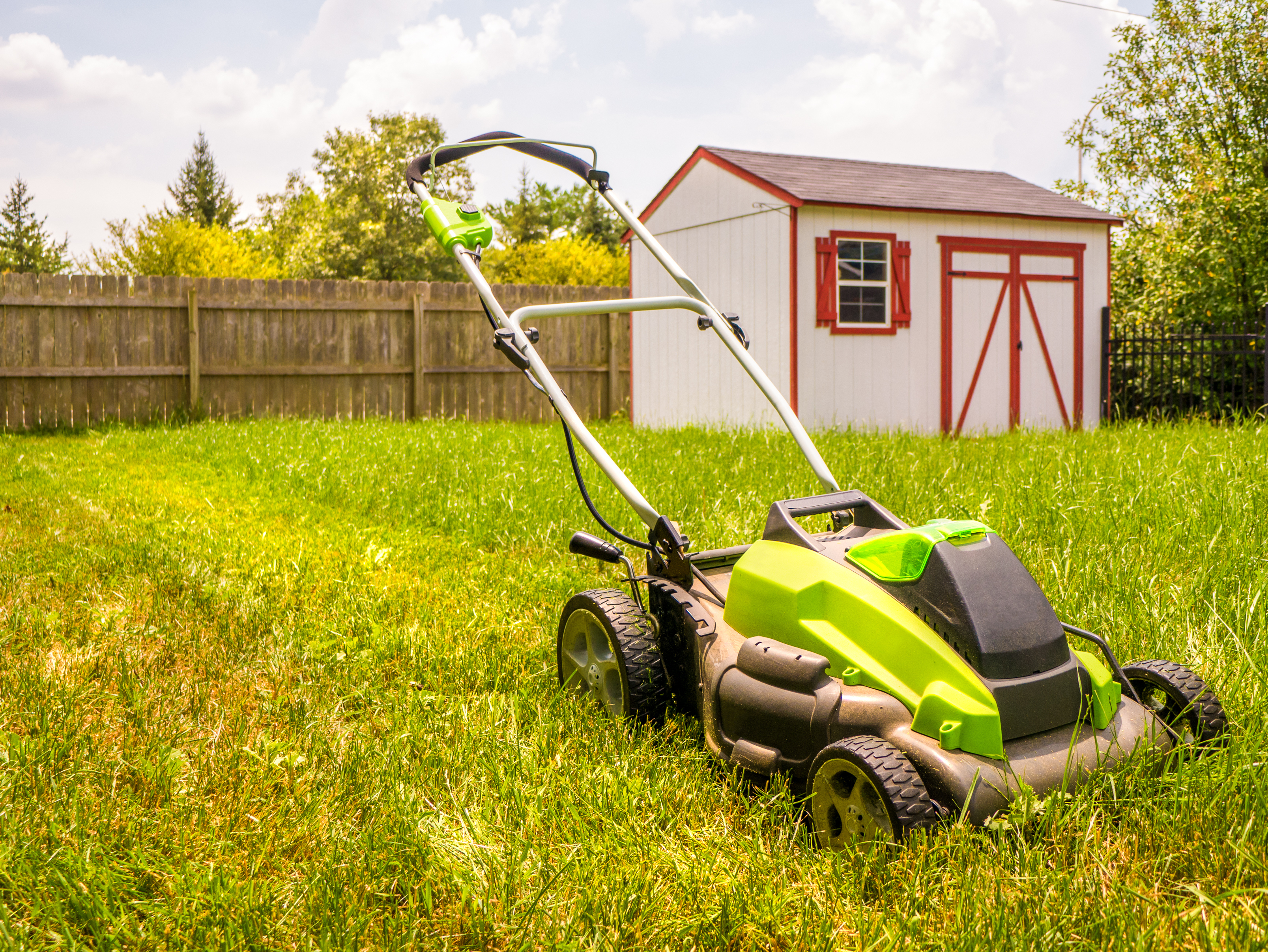
If you don't have a garden shed or garage, or there isn't sufficient space in yours, it's worth investing in a dedicated mower shed, caddy or cabinet for your machine. These low, compact structures can be bought from DIY stores and most can be discreetly situated in a corner of a patio or at the side of the house.
The best mower shed and cabinets are generally made from metal or timber with lockable double doors for easy access and security. When siting your mower shed or cabinet, ensure you have enough room to open the double doors fully and drag your mower out easily. You can even opt for shed shelving ideas to help create some space for all your gardening tools. Remember, a tight squeeze will just make hard work of it, while easy access will ensure your lawn care stays on track.
"Locate the shed or caddy near a pathway or driveway for easy transport of the mower," says Brad Ducat. "This also reduces the risk of damaging your lawn when moving the mower. If you have an electric mower, consider placing the shed or caddy near a power outlet to easily plug in the mower for charging. Ensure the ground where the shed, cabinet or caddy will sit is flat and stable. This prevents instability and potential tipping of the mower or shed. Even though it's a shed or caddy for a mower, ensure there is sufficient ventilation to prevent moisture buildup and ensure air circulation," Brad says this also helps prevent rust and mold — giving it the chance to last a lot longer.
The expert also notes that you should also "avoid placing the shed or caddy in a low-lying area where water can accumulate, as this can lead to water damage or rust on the mower."
4. Hang it up
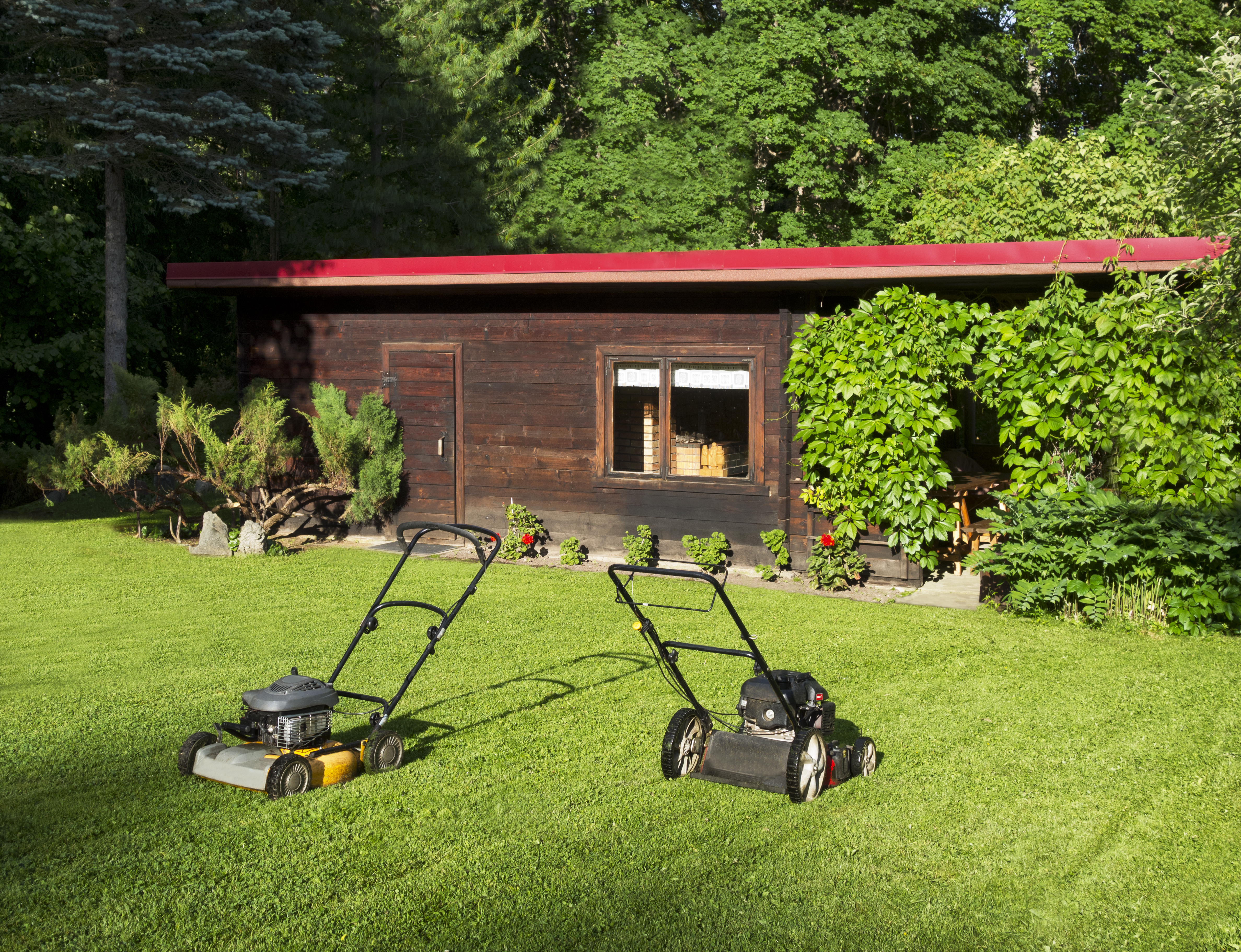
If floor space is an issue in your shed or garage, some types of lawn mower, can be hung up on some of the best walls hooks. "Lightweight electric mowers or smaller battery-powered mowers can often be hung from a wall hook," says Tony. "Use heavy-duty wall hooks that can support the mower’s weight. And ensure the hooks are securely mounted into wall studs to prevent accidents. Heavy gas mowers or larger models should not be hung due to their weight and the potential for fuel and oil leaks."
"Traditional gas mowers cannot be hung vertically because the oil and gas will mix within the engine or spill," agrees Quinten. "However, electric lawn mowers can be hung vertically from a wall hook since they do not contain gas or oil that can spill or mix together, plus they are much lighter."
Brad tells us: "Push mowers, especially lightweight and compact models, can also be suitable for hanging on hooks. They typically have a manageable weight and shape that makes them conducive to wall storage". He notes that the mower should hang securely without risk of falling or causing damage. For this he recommends using "heavy-duty hooks specifically designed for holding weight, such as steel hooks rated for tools or equipment".
"Ensure they are securely mounted into wall studs or a solid structure to support the weight of the mower," Brad adds. "The mower should hang evenly and securely. Imbalanced hanging can cause strain on the mower’s frame or handles. And make sure the hooks do not interfere with any sensitive parts of the mower, such as the handle or battery compartment (for cordless mowers)."
5. Cover it with waterproof tarpaulin
If it's not possible to store your lawn mower within a water-tight structure like a shed or garage or a secure cabinet or unit, at the very least, ensure it is not left out exposed to the elements. Rain, wind and even sunshine can damage a lawn mower over time.
"A waterproof tarp, like a waterproof grill cover could be used if you don't have a shed or garage," says Phil Catron, founder, NaturaLawn of America. "Ensure the tarp is securely tied down to protect your mower from rain and UV rays."
FAQS
Where should I store my lawn mower?
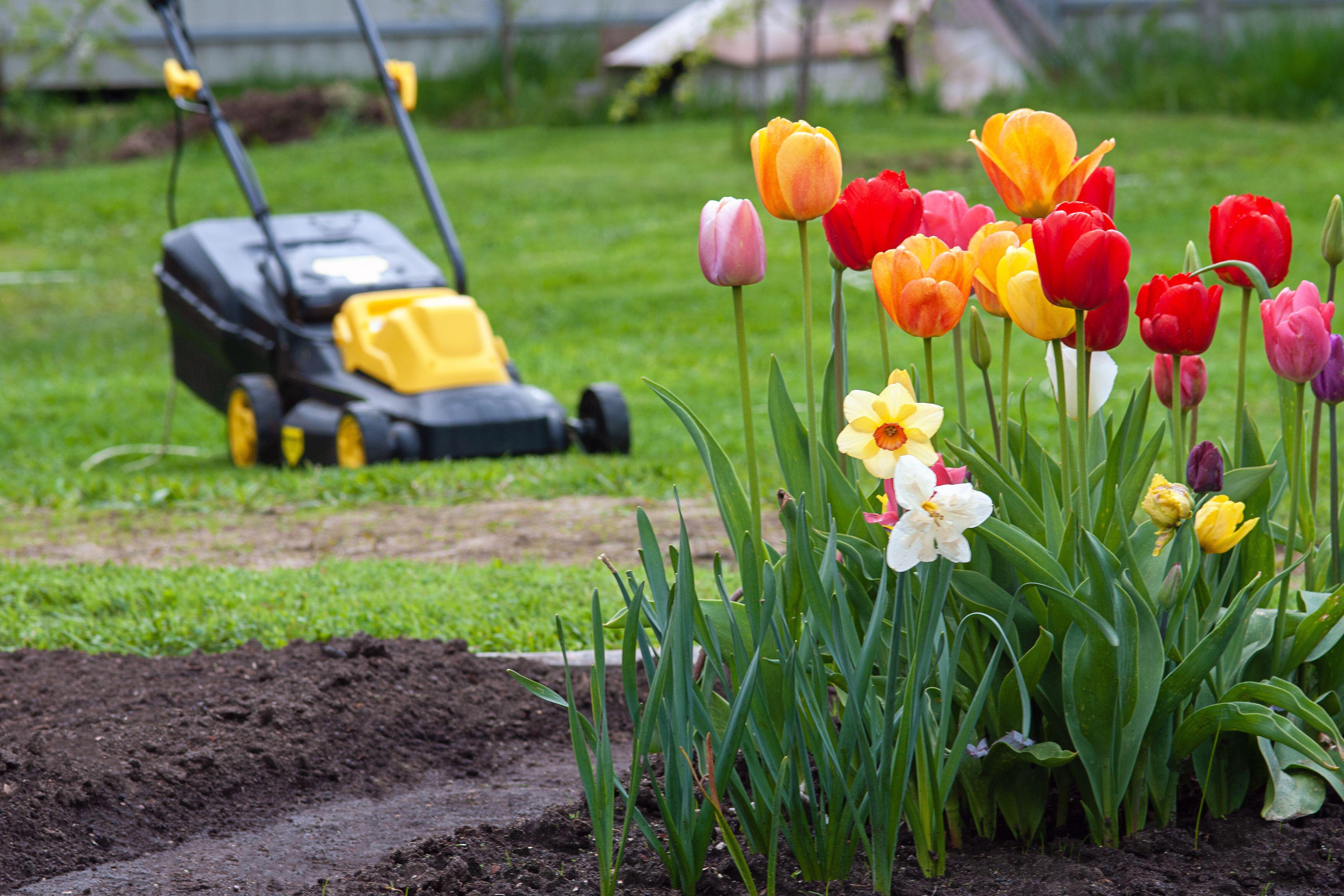
Backyard ideas can be quite the challenge if you're trying to piece things together in your space. But when it comes to taking care of your lawn, you'll need tools that work well and function properly. For this, you'll need to store your machines and little nooks away to keep them protected. In this case, the best place to store a lawn mower is a watertight, lockable garage–or shed, as this will protect it from damp, mold and cold, which can cause corrosion and damage.
According to Brad Ducat, Bradley Mowers' expert, "Store the mower on the floor of a shed or garage. Ensure it is placed on a stable surface to prevent tipping. Use a mower mat or platform to protect the floor and mower. Mowers stored in a garage are often more accessible, especially if the garage is easily accessible from the driveway or backyard. This makes it convenient to retrieve and put away the mower.
He continued: "There should be adequate ventilation in the garage or shed, especially if storing gas-powered mowers, to prevent fumes buildup. Avoid extreme temperatures and high humidity if possible, as these can accelerate rust and deterioration. Take measures to prevent rodents or pests from nesting in or around the mower. Consider using pest deterrents if necessary."
Can I leave my lawn mower outside?
It is not a good idea to leave a lawn mower outside for any length of time, due to risk of theft and damage from rain, UV rays etc. "A lawn mower should never be stored outside, but if you need to temporarily, it should have a cover," says Glen Paskett, DIY expert and founder, Saxton Blades. "The ideal location should be cool, dry and secure. This is partly because of the value of a lawnmower, which could increase the chance of theft, but also because of the damage elements can do."
Glen says the constant changing and extreme weather can rust, corrode, or melt elements of your mower. 'A lockable, leak-proof shed or garage would be perfect, ideally covered with a heavy duty tarpaulin cover, giving protection against dust and pests," Glen says. "If you don’t currently have the space for a shed, you could consider building your own DIY outdoor storage containers."







